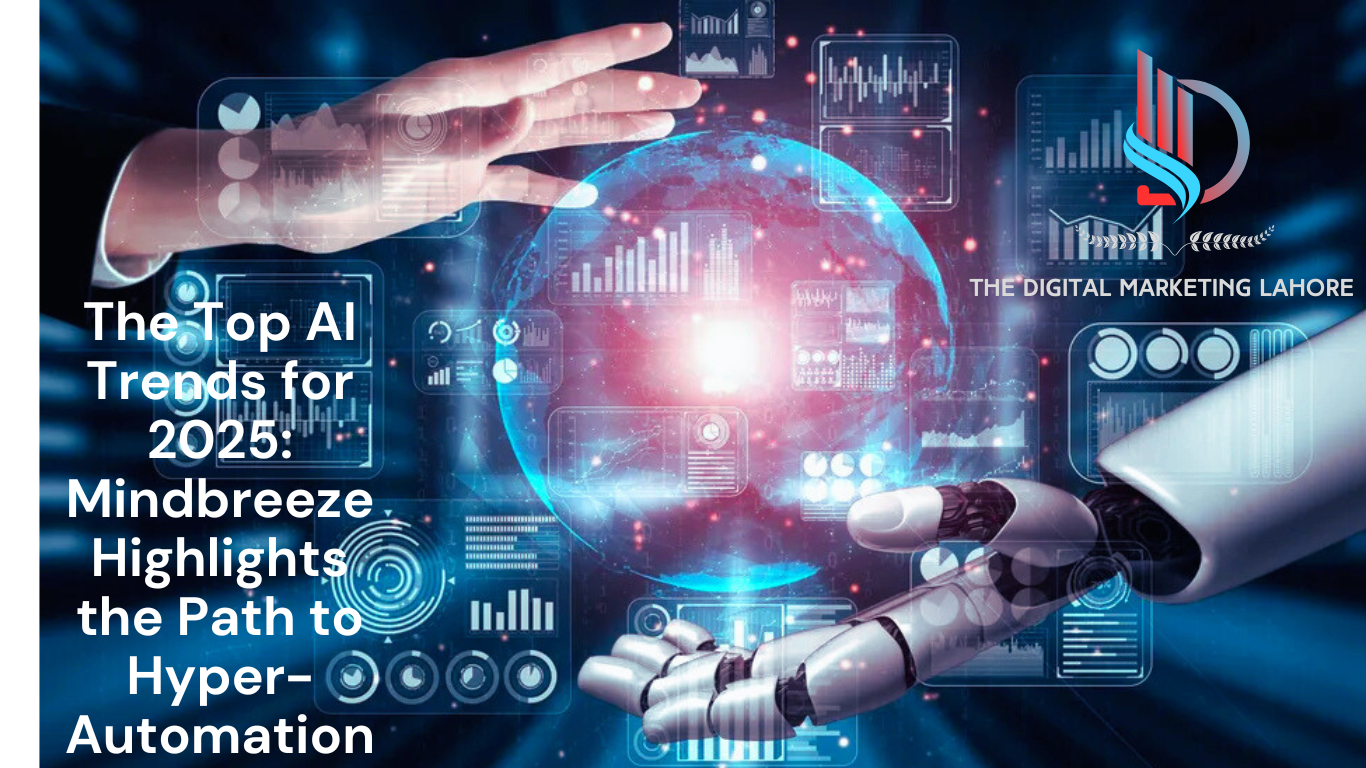
The Top AI Trends for 2025: Mindbreeze Highlights the Path to Hyper-Automation
Driving breakthroughs across many sectors, artificial intelligence (AI) has become a pillar of Digital transformation. Looking forward to 2025, artificial intelligence trends are changing quickly and the emphasis is on reaching hyper-automation—a notion meant to simplify difficult commercial operations with little human involvement. Leading companies in these developments, Mindbreeze offers practical advice to companies so they may fully use artificial intelligence. The main artificial intelligence trends for 2025 that will impact companies’ future are discussed in this paper along with how hyper-automation will redefine operational efficiency.
1. Hyper-automation: Changing Corporate Procedures
Using cutting-edge technology like artificial intelligence (AI), machine learning (ML), and robotic process automation (RPA), hyper-automation automates difficult activities formerly needing human intellect. Hyper-automation is expected to pick up speed by 2025, enabling companies to automate up to 80% of their processes.
Businesses will use AI-powered solutions to automatically make decisions, streamline operations, and boost output more and more. For areas like banking, healthcare, and retail, Mindbreeze products, for instance, use artificial intelligence to simplify data analysis, decision-making, and process execution.
Hyper-automation offers important advantages including:
- Better operating efficiency and accuracy
- quicker decision-making using real-time knowledge
- Cost savings via AI-driven optimization
Hyper-automation will be crucial for reducing manual labor and improving production as businesses strive to have a competitive advantage.
2. Personalising Across Industries Powered by AI
Personalization driven by artificial intelligence is not limited to the retail or online stores. Personalized AI driven by 2025 will revolutionize sectors like financial services, education, and healthcare.
- AI will provide patients customized treatment regimens in healthcare depending on predictive analytics and medical history.
- AI will be used on educational platforms to provide pupils tailored learning routes.
- Using AI-driven algorithms, financial institutions will provide very tailored investing solutions.
Mindbreeze and other companies are leading AI-driven solutions to provide individualized consumer experiences. Through real-time analysis of large volumes of data, companies may predict user behavior and provide customized products that foster consumer loyalty.
3. Revolutionary Natural Language Processing (NLP)
Natural language processing (NLP) is advancing greatly. Businesses will use increasingly sophisticated NLP technology by 2025 in order to enhance content development, customer service, and communication. Driven by NLP, chatbots and artificial intelligence assistants will engage with consumers in ever more human-like ways.
NLP applications will consist of:
- Real-time multilingual translating
- Modern content production using AI-generated copy
- Improved customer service using virtual assistants built on artificial intelligence
Leading solutions like Mindbreeze Inspire analyze unstructured text using NLP and deliver pertinent insights for decision-makers. NLP allows companies to easily engage with consumers across geographical or language obstacles, therefore facilitating worldwide operations and removing some of their challenges.
4. Artificial intelligence in cybersecurity: threat prediction and stopping mechanism
Artificial intelligence in cybersecurity will be vitally vital by 2025 as cyberattacks becoming ever more complicated. AI-driven systems will look at patterns, predict flaws, and neutralize cyberattacks before they become more serious.
- AI systems will detect variations in user behavior aimed to prohibit unauthorized access.
- Machine learning methods will identify hazards in real time using massive volumes of data.
- Automation will expedite responses to security breaches, minimizing potential damage.
Cybersecurity platforms leveraging AI insights will not only predict threats but will also provide businesses with recommendations to strengthen their defenses. Tools like Mindbreeze ensure secure and trustworthy AI implementation for organizations.
5. Edge artificial intelligence: source real-time processing
Edge artificial intelligence is the local, closer to where it is produced processing of AI data instead of depending on centralised servers. This approach is becoming popular as it can analyse data with low latency, therefore allowing real-time decision-making.
By 2025, Edge artificial intelligence will notably affect sectors including:
- Manufacturing: Machine predictive maintenance and real-time monitoring.
- Retail: Using smart cameras and sensors, examine customer movement.
- Autonomous vehicles: Instantaneous decisions based on environmental inputs.
Particularly in IoT settings, companies are using Edge AI to boost data security and speed and efficiency.
6. Using Actionable Insights: AI-Driven Data Analytics
Businesses will depend on AI-driven data analytics to translate data into useful insights as the volume of created data globally keeps skyrocketing. AI will not only examine data but also provide forecasts, streamline trends, and find latent patterns guiding corporate expansion.
Important developments consist in:
- Predictive analytics for knowledge of consumer preferences and actions
- Prescriptive ideas to maximize processes and lower risk
- automated reporting for quick, fact-based choices
Mindbreeze Inspire lets companies make smart, data-driven choices in real time, thereby enabling Companies that effectively use AI-driven insights will surpass their rivals in 2025.
7. IoT and artificial intelligence integration: clever ideas for a linked society
Reaching hyper-automation will depend much on the integration of artificial intelligence with the Internet of Things (IoT). Connected gadgets will be able to easily gather, evaluate, and act upon data thanks to artificial intelligence.
AI-IoT integration helps sectors including:
- AI-powered technologies controlling traffic and energy efficiency define smart cities.
- Wearable devices tracking vital signs and notifying consumers of health hazards in the medical field.
- AI sensors tracking shipments, lowering delays, and raising effectiveness in logistics.
IoT and artificial intelligence together will open the path for a more linked, automated, data-driven society.
8. Decision-Making Autonomous AI Systems
By 2025, artificial intelligence will develop to the point where autonomous systems will rule sectors needing great accuracy and dependability in decision-making. Autonomous artificial intelligence will become a necessary component of companies from self-driving cars to AI-driven supply chains management solutions.
Important uses of autonomous intelligence:
- Manufacturing: assembly line robotic automation
- Healthcare: AI analysis-based real-time diagnosis.
- Financial Services: Predictive AI models driven automated trading systems.
Leading artificial intelligence solutions, including those presented by Mindbreeze, stress the need of dependability, confidence, and flawless functioning for autonomous systems to flourish.
9. Responsible and ethical acceptance of artificial intelligence
Ethical artificial intelligence will take the stage in 2025 as AI develops. Transparency, privacy issues, and AI bias are raising questions now. Companies will embrace more ethical artificial intelligence methods that guarantee responsibility, justice, and security.
Businesses will give: top priority:
- creating objective algorithms producing equitable results.
- putting ethical AI decision-making models into use.
- improving openness by clarifying for consumers AI-driven activities.
Companies that welcome appropriate artificial intelligence will boost industry leadership and consumer confidence.
10. AI augmenting human expertise
Unlike the fiction that artificial intelligence would replace human labor, artificial intelligence augmentation emphasizes on improving human knowledge. By automating monotonous chores and offering insightful analysis, artificial intelligence systems will help staff members free to concentrate on strategic and creative projects.
AI augmenting examples include:
- Marketing artificial intelligence technologies aid in audience insight analysis.
- AI helping legal practitioners evaluate documents.
- AI-powered assistants helping teams in customer service.
Businesses making investments in artificial intelligence augmentation will find higher employee happiness and productivity, therefore encouraging innovation across their whole operations.
The Path to Hyper-Automation
In 2025, artificial intelligence presents enormous chances for companies ready to welcome change. From hyper-automation and artificial intelligence-driven data insights to Edge AI and ethical AI practices, the development of these trends will redefine operational efficiency and provide until unheard-of increase.
Prominent startups like Mindbreeze are underlining how artificial intelligence’s road to hyper-automation offers solutions that boost production, improve consumer experiences, and future-proof enterprises. Organizations that keep ahead of these trends will open countless opportunities and negotiate an AI-powered future connectedly
(FAQs)
1. Describe hyper-automation and justify its importance? By means of intelligent automation, hyper-automation employs artificial intelligence and RPA to automate business operations, hence increasing productivity and lowering costs.
2. How may artificial intelligence customize consumer interactions? By use of data analysis to grasp consumer behavior and preferences, artificial intelligence helps companies to provide customized goods, services, or content.
3. Where and in what context Edge AI finds application? Edge artificial intelligence systems localize data, hence enhancing speed and decision-making. It finds usage in IoT devices, driverless cars, and manufacturing.
4. How may artificial intelligence improve security? By examining trends, spotting abnormalities, and automating threat reactions, artificial intelligence can forecast and stop cyberattacks.
5. Will artificial intelligence replace employment for humans? No, artificial intelligence lets workers concentrate on creativity and strategy while automating tedious chores thereby increasing human competence.




